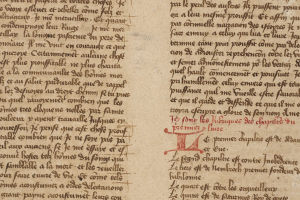Boccaccio reading from the Decamerone to Queen Johanna of Naples : WikiPedia
A University of Manchester academic has discovered an important and previously unknown manuscript by one of the medieval period’s greatest thinkers, who was born 700 years ago this year.
Dr Guyda Armstrong, Senior Lecturer in Italian, identified the uncatalogued manuscript by Giovanni Boccaccio in the University’s world famous John Rylands Library.

An Italian author and poet, Boccaccio wrote works still influential today, including the Decameron, On Famous Women, and his Elegy of Madonna Fiammetta.
The manuscript, ‘Des cas des nobles hommes et femmes’, is a copy of a rare 1400 translation of the ‘De casibus virorum illustrium’, made by the French humanist and courtier Laurent de Premierfait.
The uncatalogued manuscript has been kept at the Library since 1963. Its existence was previously known only to a few curators, before its significance was identified by Dr Armstrong. Library staff helped her identify its provenance.
She would now like to digitize the manuscript, so she can share it online with Boccaccio aficionados across the world.
She said: “The discovery of a completely unknown and unstudied manuscript in your specialist research area is every researcher’s dream.
“It’s a testament to the riches of the Rylands’ collections that works of this importance are still being discovered.
“2013 is the 700th anniversary of Boccaccio’s birth, and we are absolutely thrilled to be able to showcase this major research discovery as part of our anniversary commemorations.”
She added: “The manuscript is of major interest to scholars of Boccaccio and those working in medieval translation and textual cultures.
“Boccaccio’s De casibus is a collection of biographies of famous figures from history, whose title can be translated as either ‘the fates of famous men’, or ‘the fall of famous men’. It’s a book in the ‘mirror for princes’ genre, where the horrible histories of the past are used as a political guide for rulers, and is notable for its critique of tyranny.”
Laurent de Premierfait made two versions of his translation of the De casibus, one in 1400 and another in 1409.
However, Dr Armstrong says the Rylands’ manuscript is an extremely rare example of the first version, of which only a few copies survive worldwide.
The second, longer, version of the translation was much more popular, and many more copies survive.
This second version was the source for John Lydgate’s fifteenth-century work Fall of Princes, a copy of which is also held in the Rylands’ collections (English Manuscript 2).
The manuscript was bought by the University Library from a Parisian bookseller in 1963.
When the University took over The John Rylands Library in 1972, the manuscript was transferred there, but remained dormant in the stacks until it was brought to Dr Armstrong’s attention by curators.
Rachel Beckett, Head of Special Collections at The John Rylands Library said: “‘This is a truly remarkable discovery, and testament to the strength of the Library’s collections. It also demonstrates the value of close collaboration between curators and academic colleagues at The University of Manchester, helping us to reveal the riches of the Rylands.”





